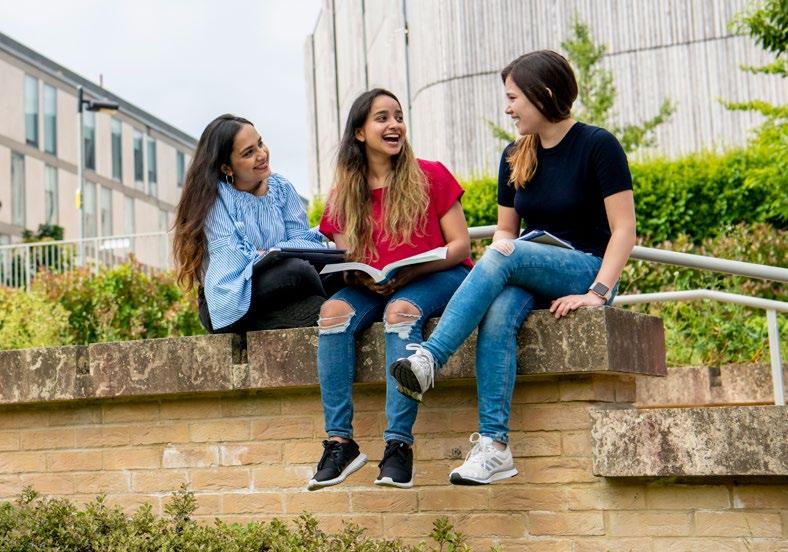
7 minute read
Foreword: Professor Mark E. Smith

THE UNIVERSITY OF SOUTHAMPTON AND THE ROLE OF HIGHER EDUCATION IN LEVELLING UP
The University of Southampton originally signed the Social Mobility Pledge as part of Southampton Connect, which brings together key city partners to improve the outcomes of the city’s people under the tag line ‘A city of opportunity where everyone thrives’.
The University is now pledging to go further by measuring the impact that it is having on an organisational level.
Between 2014 and 2020, more than 4,200 new jobs were created by spinouts linked to the University. Those 364 active companies had a combined turnover of £573m and brought £162m of investment to the region, underlining the University’s pivotal role in creating a level playing field.
The University, which currently employs over 6,100 staff, has a strong commitment to addressing environment, social and governance (ESG) issues, as evidenced throughout its investment, development and corporate activities.
The University also works extensively to encourage learners to consider progression to higher education generally, as well as to its own courses. It does this via a range of on- and off-campus activities including tours, open days, taster events, and school residentials.
Team members also carry out visits to schools and colleges each year, attending careers and higher education fairs and delivering presentations to thousands of prospective students.
The University supports the UN’s 17 Sustainable Development Goals (SDGs), which bring together the world’s most pressing economic, social and environmental challenges. According to the Times Higher Education University Impact Rankings for 2021, it stands among the world’s top 200 institutions in terms of delivering these global goals. Data submitted by 1,175 universities across 98 countries to the publication saw Southampton ranked between 101 and 200 overall in its institutional performance against the 17 SDGs.
The University scored highly for research in every SDG it entered, achieving a perfect score of 100 under ‘Partnership for the Goals’ in the sub-category of Education. Southampton also performed particularly well in Goal 3 – ‘Good health and wellbeing’ – ranking 42nd of 871 institutions worldwide.
Southampton formally launched its Sustainability Strategy in October 2020, setting out its commitment to achieving net zero direct emissions and considerably reducing indirect emissions.
The University aims to make sustainability a cornerstone of its research and societal impact, while ensuring it is part of every education programme. It is also implementing a sustainable and ethical investment policy.
In measuring itself against the levelling up framework, the University is able to take stock of its current role in driving equality in education and spreading opportunity, and identify areas for improvement.
Students studying in the Hartley Library
Between 2014 and 2020, more than 4,200 new jobs were created by spinouts linked to the University The University aims to make sustainability a cornerstone of its research and societal impact, while ensuring it is part of every education programme.
Competitive sports at our Wide Lane sports complex

Outside on Highfield Campus
CASE STUDIES
Goal 1 - Strong foundations in Early Years - Breaking down language barriers
In today’s interconnected world, it is more important than ever that we can communicate in other languages. However, the dominance of ‘global English’ means that foreign language learning in English-speaking settings can be a hard sell, according to Dr Alison Porter, Lecturer in Applied Linguistics at Southampton.
Alison’s research interests led to her co-founding the University of Southampton Primary Languages Partnership (SUPL), along with Emeritus Professor Rosamond Mitchell. SUPL is a network of researchers and teachers who collaborate to design, implement and evaluate foreign language teaching resources, funded by Economic and Social Research Council (ESRC) Impact Acceleration Awards and Impact Support Funding. “We’re working closely with around 42 primary schools across the UK to enable teachers to explore new ideas and think about changing practices.
As a result, teachers at these schools are now engaging in small-scale classroom research to develop, trial and evaluate French and Spanish literacy teaching practice.”
Working in partnership with the teachers, Alison and her team have created a bank of original, co-constructed resources that tap into different areas of the curriculum, including art, music and nature. Teachers can use the resources, develop them further and then share their ideas with other schools in the network.
Goal 2 - Successful school years - Ignite Programme
The University of Southampton has launched a new social mobility programme: Ignite, which uses different strategies to level up student’s experiences from Successful school years through Post-16 education and into Fair career progression. Elements of the levelling up agenda are embedded throughout to ensure that students have the skills to succeed.
The Ignite Programme is split into three stages. Firstly, Ignite Your Journey works with care-experienced and lookedafter children in year 11, offering mentoring from current University of Southampton students with lived experience of the care system as well as focused English and maths tuition to support attainment at GCSE stage. It is recognised across the sector that GCSE attainment has the real impact on care experienced children accessing and succeeding in higher education and Ignite Your Journey aims to provide positive, on-campus experiences to start to change this.
The University of Southampton will have 10 students joining the first Ignite Your Journey programme in October 2021 with an aim to increase this in the following academic year. The aim is for the University to be a hub of the community for looked-after children and use its excellent facilities to expand aspirations and increase participation.
The second stage of the programme, Ignite Your Success which, launched in October 2020, works with first-year undergraduate students who either have a care leaver background or who come from areas in the Indices of Multiple Deprivation, quintile one (IMD Q1) measurement on admission. This group of 31 students join our Ignite community in their first year and complete a series of workshops exploring their journey to higher education and the unique skills and experiences they bring. They have a safe space to discuss matters that might make them feel different from their peers including financial matters, identity and how to make connections, which can help them in their future careers. All students undertake a guaranteed internship in their first year, an international opportunity in their second
year, and have a mentor in each year of study. They also all receive additional financial support.
All students in the 2020/21 cohort completed their first year, with 81% progressing to their second year. Students have reported high levels of satisfaction with 89% saying they had been inspired or had their aspirations raised by the Ignite workshops. Additionally, 94% were either satisfied or really satisfied with the workshops and 94% said they found the alumni speakers either helpful or very helpful when thinking about their future. Students engaged whole heartedly, with 97% completing their internship in their first year - the final student will complete this in their second year. 78% said that the workshops provided them with careers information they wouldn’t otherwise have been aware of and 73% have completed follow-up research on jobs and careers outside of the sessions.
From 2021/22 the University will be more focused on recording the impact of the programme through two areas: high-level data (retention, awards, graduate outcomes, completion) and deep-level impact (self-esteem, efficacy, self-determination, engagement and belonging).
The University has also received very encouraging feedback from the students about their experiences, from the supportive network (“[The] social aspect of the Ignite Programme…enabled me to meet other students from different year groups across the University, especially during lockdowns and not being able to meet anyone. It also gave me the opportunity to be able to discuss student experience, support students and make friends”) to the employability enhancing opportunities (“I have had the opportunity to apply and be accepted for an internship, which has given me a chance to boost some of my workplace skills. The weekly sessions we have expose us to a range of speakers who provide us with some great advice for a range of topics”) and the financial stability the bursary provides (“Receiving the funding has lifted a huge weight off my shoulders! It meant that I could focus on my studies instead of worrying and feeling guilty about how much the things I needed was going to cost me”).
The University will build on these successes in the final stage: Ignite Your Future, which will focus on improving progression to graduate employment and further study, and is currently in development.






